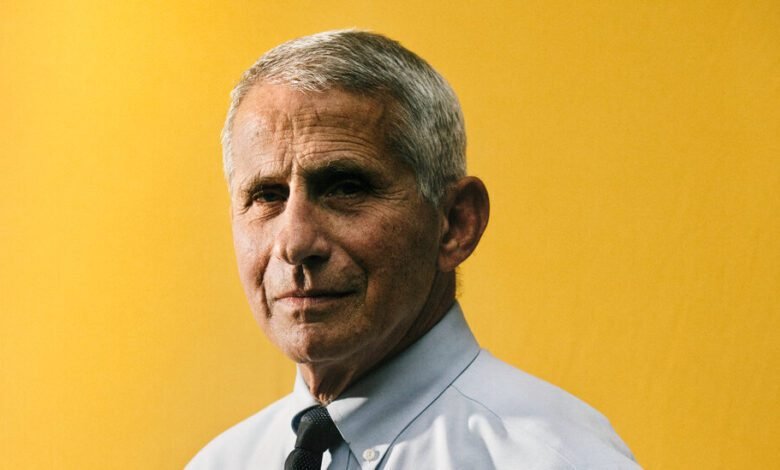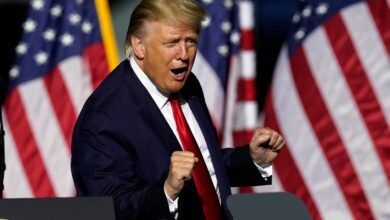Fauci speaks his mind about Trump’s anger and their ‘complicated’ relationship

Three months into the coronavirus pandemic, Dr. Anthony S. Fauci was at home in Northwest Washington when he answered his cell phone to President Donald J. Trump, yelling at him in an expletive-filled speech. He provoked the president’s ire by commenting that vaccines in development might not provide lasting immunity.
That was the day, June 3, 2020, “when I first experienced the weight of the president’s anger,” Dr. Fauci writes in his forthcoming autobiography.
Fauci has long been cautious about describing his feelings toward Trump. But in the book “On Duty: A Doctor’s Journey in Public Service,” he writes candidly about their relationship, which he describes as “complicated.”
In a chapter titled “He Loves Me, He Doesn’t Love Me,” Dr. Fauci described how Trump repeatedly told him that he “loved” him while criticizing him with profanity-laced tirades.
“The president was irate and said I couldn’t keep doing this to him,” Dr. Fauci wrote. “He said he loved me, but the country was in trouble and I was making the situation worse. He added that the stock market only rose 600 points in response to the positive news about the Phase 1 vaccine, and should have risen 1,000 points, and so it cost the country ‘a trillion dollars.’” (The president added an expletive . )
“I have very thick skin,” Dr. Fauci added, “but being yelled at by the President of the United States, no matter how much he says he loves you, is not fun.”
The book, which will be released on June 18, traces the arc of Dr. Fauci’s life, from his childhood in Brooklyn as the son of first-generation Italian Americans (his father was a pharmacist and the family lived above the “Fauci Pharmacy”). ) throughout his 54-year career at the National Institutes of Health, 38 of them as director of the National Institutes of Allergy and Infectious Diseases.
It’s 450 pages long, and Dr. Fauci devotes about 70 of them to the first year of the coronavirus pandemic, when Trump was in office. His criticisms of Trump and his White House are sometimes scathing and other times oblique, leaving readers to draw their own conclusions.
Fauci served under seven presidents, leading the nation through infectious disease threats including AIDS, swine flu, anthrax and Ebola. But the coronavirus pandemic has turned him into a polarizing public figure and a target of Republicans, especially Trump’s most ardent supporters.
During a tense hearing this month before the House Select Subcommittee on the Coronavirus Pandemic, Dr. Fauci vehemently denied Republican allegations that he helped fund the research that started the pandemic or covered up the possibility that it originated in a laboratory. He called the accusations “absolutely false and simply absurd.”
By Dr. Fauci’s account, Trump’s White House was unlike any other he had experienced, not least because of his passing relationship with the truth. Trump, he wrote, “shocked me on the first day of his presidency with his disregard for facts like the size of the crowd at his inauguration” and his “aggressive disrespect for the press.”
Those differences extended to the relationship between Trump and Vice President Mike Pence, chairman of the White House coronavirus response task force.
“Vice presidents,” wrote Dr. Fauci, “are almost always publicly loyal to the president. That’s part of the job. But in my opinion, Vice President Pence has sometimes gone overboard. During task force meetings, he would often say some version of, ‘There are a lot of smart people around here, but we all know the smartest person is up there.'”
Then, without explicitly saying that Pence was referring to Trump, Fauci wrote: “He was, of course, talking about the man sitting behind the Resolute Desk in the Oval Office.”
Fauci also makes it clear that he didn’t much like some of Trump’s advisers: his chief of staff, Mark Meadows; his chief economic advisor, Peter Navarro; and his medical advisor, Scott Atlas. He said Trump’s aides were feeding negative stories about him to journalists in 2020.
“The White House’s growing hostility toward me over the spring and summer seemed to trigger, at least in part, the open attacks against me by right-wing media and trolls using social media platforms,” Dr. Em wrote. August of that year, he opened a letter containing a “fine white powder” and “instantly feared anthrax or worse.” Hazardous materials teams were called to his office at the National Institutes of Health; a few days later, the FBI confirmed that the gunpowder was harmless.
Dr. Fauci’s first meeting with Trump was before the coronavirus pandemic, at a White House ceremony where the president signed an executive order calling for improvements in the production and distribution of flu vaccines. After the event, Trump commented to Dr. Fauci that he had never gotten the flu shot.
“When I asked him why, he said, ‘Well, I’ve never had the flu. Why did I need a flu shot? I did not respond,” Dr. Fauci wrote. The implication was clear: The doctor was stunned to discover that Mr. Trump knew so little about the purpose of vaccines.
On the morning of January 29, 2020, Dr. Fauci wrote, conservative political commentator Lou Dobbs, whom the doctor had known for years, called to say that Trump wanted to meet him. Several hours later, Dr. Fauci found himself in the White House Situation Room, briefing the president and his top advisers on a new virus that was circulating in China. It was immediately clear to Dr. Fauci, the scientist from Brooklyn, that he and Trump, the president from Queens, could bond in a way that only New Yorkers can.
“He had a New York swagger that I recognized instantly – a self-assured, back-patting charisma that reminded me of my days in New York,” Dr.
But that was where the kinship ended. Fauci wrote that when Trump adopted the antimalarial drug hydroxychloroquine as a Covid treatment based on anecdotal evidence, he realized that “sooner or later I would have to publicly refute it.”
He painted the president as someone concerned about television ratings and the economy; following a coronavirus briefing in March 2020, Trump summoned Dr. Fauci to the Oval Office and called Fox News personality Sean Hannity. Fauci recalled the moment: “’Hey, Sean,’ he said on speakerphone. ‘You should see the reviews we have!’”




